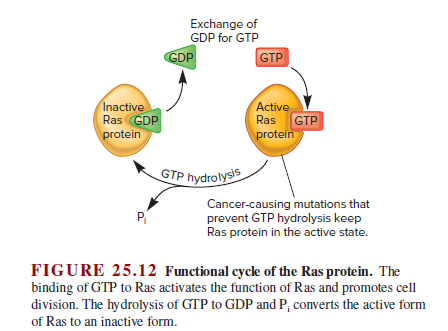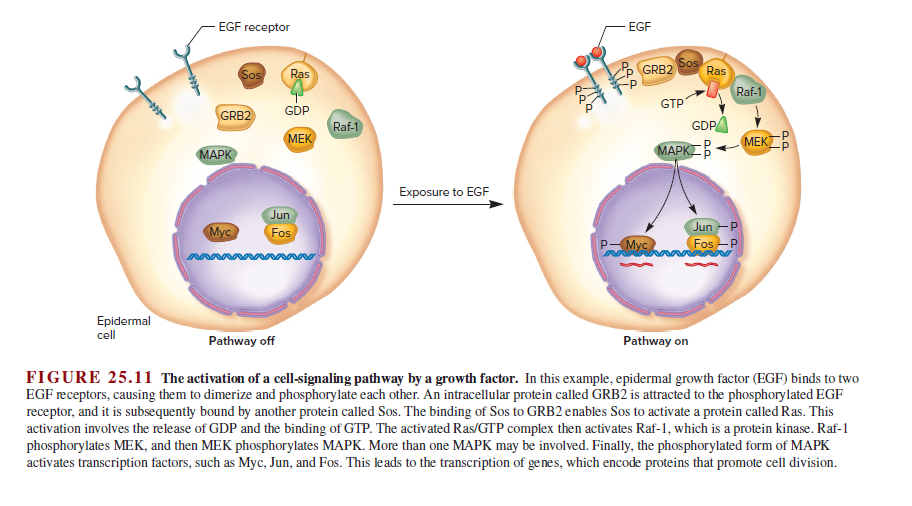
Biochemistry
6th Edition
ISBN: 9781305577206
Author: Reginald H. Garrett, Charles M. Grisham
Publisher: Cengage Learning
expand_more
expand_more
format_list_bulleted
Concept explainers
Question
How would a mutation that prevents the Ras protein
from hydrolyzing GTP affect the cell-signaling pathway in 25.11?

Transcribed Image Text:Exchange of
GDP for GTP
GDP
GTP
Inactive
Ras GDP
protein
Active
Ras GTP
protein
GTP hydrolysts
Cancer-causing mutations that
prevent GTP hydrolysis keep
Ras protein in the active state.
FIGURE 25.12 Functional cycke of the Ras protein. The
binding of GTP to Ras activates the function of Ras and promotes cell
division. The hydrolysis of GTP to GDP and P; converts the active form
of Ras to an inactive form.

Transcribed Image Text:EGF receptor
EGF
Sos
Ras
Sos
GRB2
Ras
Raf-1
GDP
GTP
GRB2
Raf-1
GDP
MEK
MEK
MAPK
MAPKB
Exposure to EGF
Jun
Jun -P
Myc
Fos
Myc
Fos -P
Epidermal
cell
Pathway off
Pathway on
FIGURE 25.11 The activation of a cell-signaling pathway by a growth factor. In this example, epidermal growth factor (EGF) binds to two
EGF receptors, causing them to dimerize and phosphorylate each other. An intracellular protein called GRB2 is attracted to the phosphorylated EGF
receptor, and it is subsequently bound by another protein called Sos. The binding of Sos to GRB2 enables Sos to activate a protein called Ras. This
activation involves the release of GDP and the binding of GTP. The activated Ras/GTP complex then activates Raf-1, which is a protein kinase. Raf-1
phosphorylates MEK, and then MEK phosphorylates MAPK. More than one MAPK may be involved. Finally, the phosphorylated form of MAPK
activates transcription factors, such as Myc, Jun, and Fos. This leads to the transcription of genes, which encode proteins that promote cell division.
Expert Solution
This question has been solved!
Explore an expertly crafted, step-by-step solution for a thorough understanding of key concepts.
This is a popular solution
Trending nowThis is a popular solution!
Step by stepSolved in 2 steps

Knowledge Booster
Learn more about
Need a deep-dive on the concept behind this application? Look no further. Learn more about this topic, biochemistry and related others by exploring similar questions and additional content below.Similar questions
- In the normal cycle of Ras activity, when Ras is bound to y activity that removes a phosphate to convert GTP back to GDP and this it is inactive. Activation of Ras involves exchanging GDP for The Ras protein has intrinsic Ras. inactivates activates ATP GTP «< Questic A Moving to another question will save this response. ADP GDP GTPase Clo nucleasearrow_forwardras GDP ras ras P.P P.P GTP raf Inactive Active raf Inside of cell Refer to the figure above. A portion of a signal transduction pathway is shown in the figure. The molecule raf is a protein kinase. This molecule becomes activated when a GTP-ras complex binds to it. Which equation describes how activated raf transmits the signal in this pathway? O ATP. --> CAMP +PPi O CAMP --> AMP Inactive enzyme + ATP --> active phosphorylated enzyme + ADP O Inactive phosphorylated enzyme + ADP --> inactive enzyme + ATP Inactive enzyme + ADP --> active phosphorylated enzyme + ATP Assessment Navigator Submit Questionmark Ondemand licensed to University of Dundee PPIParrow_forwarda change that decreases the rate of hydrolysis of GTP by Ras a change that increases the affinity of Ras for GDP a change that decreases the affinity of Ras for GTP O a change that prevents Ras from being madearrow_forward
- GTP binding proteins are molecular switches. How do GTP binding proteins work? Provide two examples of GTP binding proteins that function in intracellular protein transport. Make a drawing that illustrates the function of each of these proteins in their respective roles. Predict the direct outcome of a mutation that: Inhibits GTPase activity Inhibits interaction with the GEFarrow_forwardExplain why in cells that are genetically NF1–/–, basal levels of GTP-bound activated Ras are higher than normal and respond to growth factor stimulation by increasing rapidly to far higher levels.arrow_forwardPredict the eff ect on cell growth of an Sos mutation that decreased its affi nity for Ras.arrow_forward
- Match the protein on the left with the type of activation of that protein on the right STAT Smad PKA Ras NFKB Nuclear receptor [Choose] [Choose] GTP binding serine phosphorylation Interaction with Galpha Cleavage by y-secretase destruction of a protein by proteasome tyrosine phosphorylation second messenger ligand binding [Choose] [Choose] [Choose]arrow_forwardRGS proteins accelerate the GAP activity of Gα subunits. What is the direct result of this GAP activity? - hydrolysis of GTP, resulting in a GDP-bound Gα - phosphorylation of GDP to GTP, resulting in a GTP-bound Gα - an exchange of GTP for GDP bound to Gα - an exchange of GDP for GTP bound to Gαarrow_forwardTumor necrosis factor (TNF) signaling Explain in detail each step in figure 8.53. Make sure to include an explanation of the proteolytic and phosphorylation cascades.arrow_forward
- The egfr kinase independent transactivation of the ras pathway does require egfr. Explain this apparent contradiction.arrow_forwardCell signaling The maximum secretion rates of proteins are one type of limiting constraint on signal-ing processes since a cell cannot send a signal faster than it can secrete it. These maximum signalingrates can be estimated with maximum rates of transcription and translation. Consequently, proteins withstrong promoters can be synthesized at much higher rates. Immunoglobulins, which are important signal-ing molecules, have very strong promoters. Their maximum secretion rate is on the order of 2000 to 8000antibody molecules/cell/second, which corresponds to approximately 1 pg/cell/hr. Part AWhat would be the maximum signal (in pg/cell/hr) that a cell could send for the following situations: (1)Signal molecule A has a MW = 100,000 daltons and is secreted at a rate of 1000 molecules/cell/second. (2)Signal molecule B has a MW = 50,000 daltons and is secreted at 5000 molecules/cell/second.Part BWhich molecule is secreted at a higher rate? By how much?Part CIf equivalent fluxes of both…arrow_forwardSpecificity in fusion between vesicles involves two discrete and sequential processes. Describe the first of the two processes and its regulation by GTPase switch proteins. What effect on the size of early endosomes might result from overexpression of a mutant form of Rab5 that is stuck in the GTP-bound state?arrow_forward
arrow_back_ios
SEE MORE QUESTIONS
arrow_forward_ios
Recommended textbooks for you
 BiochemistryBiochemistryISBN:9781305577206Author:Reginald H. Garrett, Charles M. GrishamPublisher:Cengage Learning
BiochemistryBiochemistryISBN:9781305577206Author:Reginald H. Garrett, Charles M. GrishamPublisher:Cengage Learning Biology 2eBiologyISBN:9781947172517Author:Matthew Douglas, Jung Choi, Mary Ann ClarkPublisher:OpenStax
Biology 2eBiologyISBN:9781947172517Author:Matthew Douglas, Jung Choi, Mary Ann ClarkPublisher:OpenStax Biology: The Dynamic Science (MindTap Course List)BiologyISBN:9781305389892Author:Peter J. Russell, Paul E. Hertz, Beverly McMillanPublisher:Cengage Learning
Biology: The Dynamic Science (MindTap Course List)BiologyISBN:9781305389892Author:Peter J. Russell, Paul E. Hertz, Beverly McMillanPublisher:Cengage Learning

Biochemistry
Biochemistry
ISBN:9781305577206
Author:Reginald H. Garrett, Charles M. Grisham
Publisher:Cengage Learning

Biology 2e
Biology
ISBN:9781947172517
Author:Matthew Douglas, Jung Choi, Mary Ann Clark
Publisher:OpenStax

Biology: The Dynamic Science (MindTap Course List)
Biology
ISBN:9781305389892
Author:Peter J. Russell, Paul E. Hertz, Beverly McMillan
Publisher:Cengage Learning